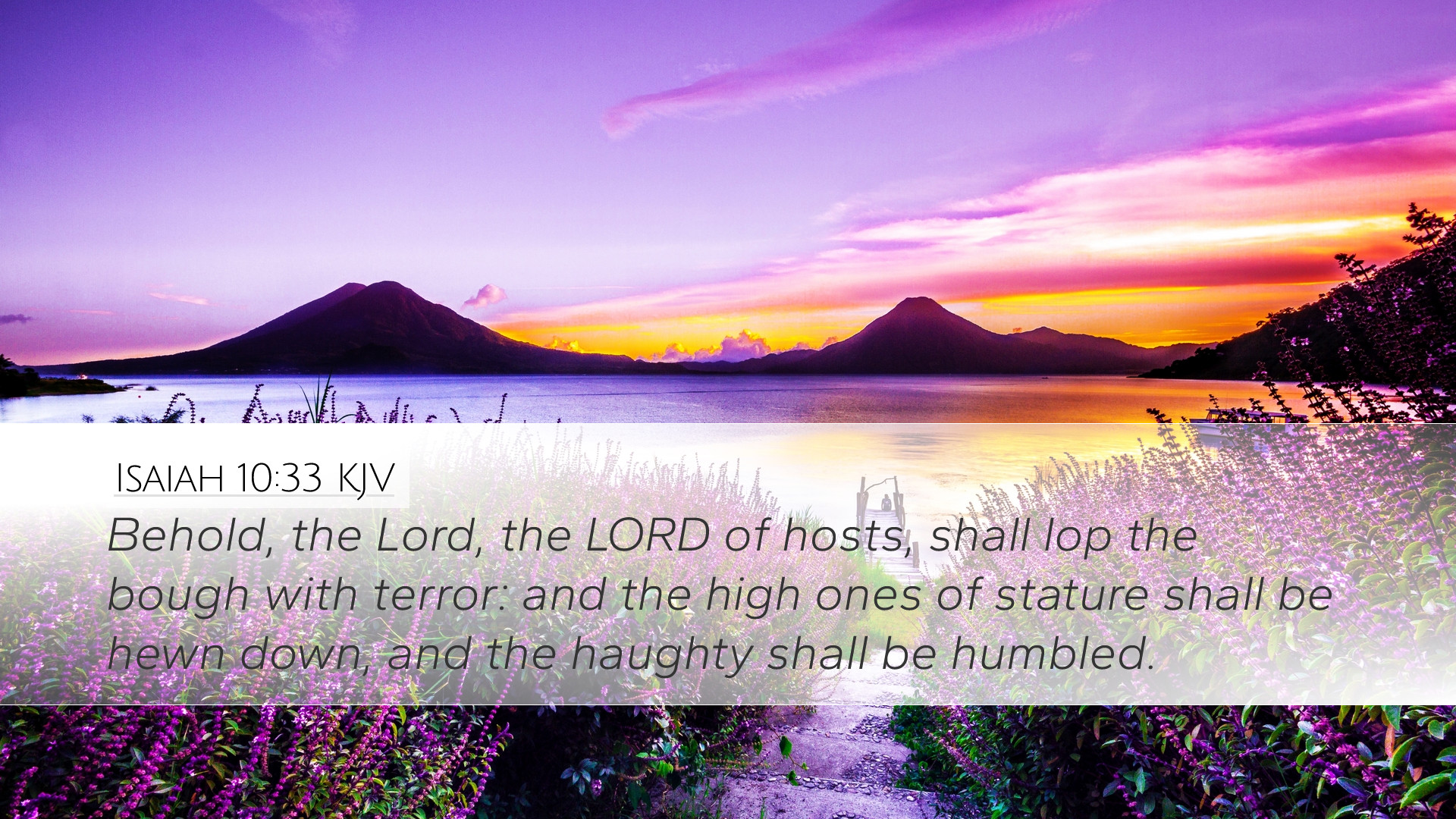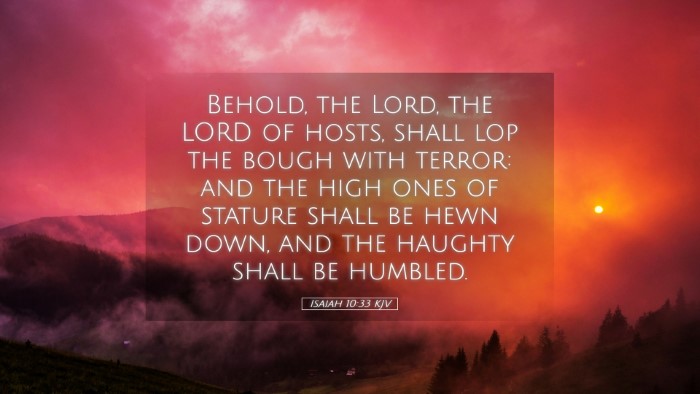Commentary on Isaiah 10:33
Isaiah 10:33 states: "Behold, the Lord, the Lord of hosts, shall lop the boughs with terror: and the high ones of stature shall be hewn down, and the haughty shall be humbled."
Introduction
This verse encapsulates a profound message of judgment and divine intervention against pride and arrogance. It serves as a reminder of God's sovereignty and the inevitable downfall of those who stand in opposition to His will.
Matthew Henry's Commentary
Henry emphasizes the imagery of God as a master gardener, who "lops the boughs" with precision and authority. He notes that this metaphor reflects the divine judgment directed toward the proud and mighty.
- The High Ones of Stature: Henry interprets "high ones" as those who are exalted in their own eyes, representing both earthly powers and individuals who have placed themselves above the moral and divine order.
- The Haughty Shall Be Humbled: This phrase underscores the theme of humility before God. Henry underscores that pride leads to downfall, a recurring Biblical principle noted throughout scripture.
Albert Barnes' Analysis
Barnes explores the implications of divine judgment as it relates to historical context. He reflects on the Assyrian empire, which had grown vast and powerful at the time of Isaiah's prophetic message.
- Covenant Justice: Barnes outlines the concept of covenant justice, explaining that God uses foreign nations to execute His purposes, but ultimately holds them accountable for their actions against His people.
- Symbolism of the Chop: The metaphor of lopping signifies a drastic remedy. Barnes conveys that such actions are not just destructive but rather cleansing, signifying God's displeasure and the need for purification.
- Hope in Judgment: While the verse speaks of judgment, Barnes points to a thread of hope throughout the prophecies. Though judgment falls upon the proud, there remains a promise of restoration for the humble and repentant.
Adam Clarke's Insight
Clarke provides a detailed examination of the text with an emphasis on the “Lord of hosts,” signifying God's command over all creation and His authority to execute judgment.
- Divine Authority: Clarke notes that this phrase reinforces the idea that God, as sovereign, can and will act decisively against those who oppress others, particularly the Israelites.
- Terrifying Consequences: The mention of “terror” indicates the overwhelming fear that accompanies God’s judgment. Clarke posits that the subjects of this terror will have nowhere to hide as their pride is laid bare.
- Contextual Historical Interpretation: Clarke suggests that the prophecy not only addresses the Assyrians but serves as a timeless warning to all nations and individuals who raise themselves against God.
Theological Reflections
This verse invites reflection on several theological themes that are of particular interest to pastors, theologians, and scholars.
- Sovereignty of God: Isaiah 10:33 affirms God's absolute sovereignty over nations and individuals. It questions the reliance on human strength and invites humility before divine authority.
- Human Pride and Divine Judgment: The relationship between pride and judgment is starkly portrayed. The biblical narrative consistently teaches that God opposes the proud but gives grace to the humble.
- Restoration after Judgment: While judgment is a theme of the text, it simultaneously points toward possibility— God's intent to restore the faithful remnant following periods of correction.
Applications for Today
For pastors and church leaders, Isaiah 10:33 serves as a powerful scripture to draw from when preaching about the nature of God’s justice and mercy.
- Call to Humility: It encourages congregations to seek humility and righteousness, rather than exaltation and self-sufficiency. The message of humility resonates in a world filled with pride and competition.
- Divine Justice in Society: This verse can be applied to advocate for social justice, reminding believers that God is deeply concerned with the ethical actions of nations and their leaders.
- Encouragement in Trials: For believers facing opposition or injustice, this passage can serve as a reminder of God’s promise to right every wrong and to take care of the humble in heart.
Conclusion
Isaiah 10:33 is a profound verse that encapsulates critical themes within Biblical theology. Through insights from esteemed commentaries, we gain a deeper understanding of God’s judgment against pride and the eventual triumph of humility. It serves as a reminder to today’s believers to stand vigilantly against haughtiness and to look to the Lord for their strength and refuge.


